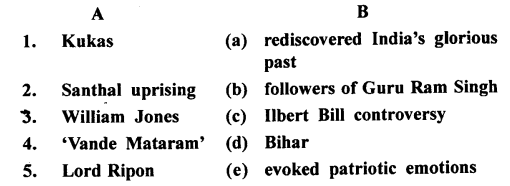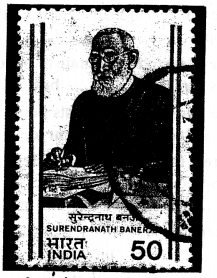The Trail History and Civics for Class 8 ICSE Solutions – Rise of Indian Nationalism
ICSE SolutionsSelina ICSE SolutionsML Aggarwal Solutions
The Trail History and Civics for Class 8 ICSE Answers
Trail HistoryCivics Focus on HistoryCivics GeographyBiologyChemistryPhysicsMaths
EXERCISES
A. Fill in the blanks:
- Modem Indian nationalism arose to meet the challenge of Foreign domination.
- Exploitation of India by the British was direct and harsh before 1857; after 1857 it became subtle and systematic.
- The Kukas Rebellion was an armed rebellion of the Sikhs against the British policy of divide and rule.
- The English language acted as a link language among the educated Indians.
- A.O. Hume laid the foundation of the Indian National Congress in December 1885.
B. Match the following:

Answer:

C. Choose the correct answer:
1. ‘Vande Mata ram’ was written by Swami Vivekananda/Raja Ram Mohan Roy/Bankim Chander Chattopadhyaya.
Ans. ‘Vande Mataram’ was written by Bankim Chander Chattopadhyaya.
2. Lord Ripon/Lord Lytton/Lord Dalhousie approved the Ilbert Bill.
Ans. Lord Ripon approved the Ilbert Bill.
3. The Indian National Congress was established in 1883/1885/ 1890.
Ans. The Indian National Congress was established in 1885.
4. The first session of the Indian National Congress was attended by 62/72/82
Ans. The first session of the Indian National Congress was attended by 72 delegates.
5. The first session of the Indian National Congress was presided over by C. Bannerjee/Surendranath Banerjea/A.O. Hume.
Ans. The first session of the Indian National Congress was presided over by W.C. Bannerjee.
D. State whether the following are true or false:
- The Revolt of 1857 had failed to rid India of foreign rule.
True. - Western education and modern ideas could not bring the Indians together.
False.
Correct: Western education and modem ideas bring the Indians together. - Racial arrogance and racial discrimination by the British caused great resentment among Indian intellectuals.
True. - The Ilbert Bill had to be amended as the European reacted violently to it.
True. - A.O. Hume was not supported by nationalist Indian leaders.
False.
Correct: A. O. Hume was supported by nationalist Indian leaders.
E. Answer the following questions in one or two words/ sentences:
Question 1.
Define nationalism.
Answer:
Nationalism may be defined as a devotion and loyalty to one’s own nation, patriotism. It is also the policy or doctrine of asserting the interest of one’s own nation viewed as separate from the interests of others nations or common interest of all nation.
Question 2.
Name any two Western scholars who researched the Indian past and rediscovered its rich heritage.
Answer:
European scholars like William Jones, Alexander Cunningham, James Prinsep and other Indologists, who researched India’s historical past and revealed its rich heritage.
Question 3.
How did the British economic policies in India transform India into an agricultural colony.
Answer:
British economic policies in India had deliberately transformed India into an agricultural colony. India had become a supplier of British raw materials and a market for British manufactured products.
Question 4.
Why was the Ilbert Bill introduced and by whom?
Answer:
Lord Ripon, who followed Lord Lytton, wanted to change some of the discriminatory policies of the government. He approved the Ilbert Bill which proposed that Indian judges be allowed to try Europeans (whites) accused of crimes.
Question 5.
When and where was the first session of the Indian National Congress held?
Answer:
The first session of the Congress was held in Bombay (now Mumbai) in December 1885.
F. Answer the following questions briefly:
Question 1.
There were many factors that led to the rise of nationalism in India. In the light of this statement, answer the following questions:
(a) In what way did the Revolt of 1857 impact the rise of nationalism in India?
(b) What changes did Western education bring about in the traditional Indian outlook?
(c) The English language acted as a link language among the Indians. Explain.
Answer:
(a)
Exploitation after Revolt of 1857, was subtle and systematic. The impact of exploitation was felt by almost all sections of Indian society, but it took several decades to comprehend the true nature of British rule and establish the link between British polices and India’s growing poverty. Several armed revolts took place after 1857. The Kuka rebellion was one such revolt. It was a protest against the deliberate policy of the British to create a rift between the Hindus and the Muslims.
(b)
The British had introduced Western Education in India to create a class of loyal clerks and Anglicized buyers of British goods. Western education did that and much more. It opened the floodgates of modem knowledge and rational thinking. New ideas of humanism, nationalism and democracy transformed the traditional outlook of the people. A new class arose-English-educated Indians-small in number but who in course of time, would produce, leaders and organizers of a national movement.
(c)
The English language acted as a link language between the educated Indians and various parts of the country. Thus, it played a very significant role in fostering feelings of unity among educated Indians from different provinces and linguistic regions of the country. The barriers of language now broke down as the English language became the common medium of communication. Educated middle class Indians who spoke different language could now express their views and exchange ideas among themselves in English. A common language fostered a sense of oneness and understanding of their Indian identity.
Question 2.
In the context of the causes of the rise of Indian nationalism, answer the following questions:
(a) How did the British administrative system indirectly create conditions favourable for the growth of Indian nationalism.
(b) Examine the role of modern transport and communication in fostering unity and nationalism among the people.
(c) How did the rediscovery of India’s glorious past prepare the ground for the growth of the national spirit among the Indians.
Answer:
(a)
The British transformed a fragmented India into a united whole under their rule. They introduced a uniform and modern system of government throughout the British provinces. Uniform laws were applied to all British subjects. People from different provinces and from different communities and castes now followed the same laws and regulations. They gradually realized that they all belonged to the same country and shared a common national identity as Indians.
(b)
This growing sense of unity and nationalism was further strengthened when the British introduced a new network of roads, railways and the post and telegraph system. Social mobility and interaction increased. Caste barriers broke down. People from different parts of the country grew closer to each other. They realized that they shared common problems, common aspirations and common goals. They belonged to one nation.
(c)
The rediscovery of a past was great and glorious. It was a past that could boast of the intellectual richness of Vedic philosophy, the political unity and administrative wisdom of the Mauryas, the Golden Age of the Guptas and the cultural brilliance of the Mughals. These discoveries were made by European scholars like William Jones, Alexander Cunningham, James Princep and other Indologists, who researched India’s historical past and revealed its rich heritage. These revelations instilled in the Indians feelings of national pride and self-confidence and inspired them to dream of a new resurgent India.
Question 3.
With reference to the rise of Indian nationalism, answer the following questions:
(a) What was the role of vernacular press and literature in the rise of Indian nationalism?
(b) How did the British economic policies lead to the growth of Indian nationalism?
(c) Mention the discriminatory policies that were greatly resented by the Indian intellectuals.
Answer:
(a)
The vernacular press played a vital role in spreading modem ideas and creating national awareness. Nationalist leaders, the best among the educated middle-class intellectuals, used the press to criticize British policies and expose the evils of foreign rule. The ideas of democracy and responsible government were popularized through the press. Indians were asked to unite and work for the welfare of the nation.
National literature also inspired the spirit of nationalism among the people. Novels, essays and patriotic poems written by well-known authors and poets fired the imagination of the common people and gave rise to powerful patriotic feelings. Bankim Chandra Chattopadhyaya’s ‘Vande Mataram’ continues to evoke strong patriotic emotions among Indians even to this day.
(b)
The drain of India’s wealth to Britain, the impoverishment of the masses, industrial decay, grinding poverty, frequent famines, and the indifference and apathy of the British government produced a nationalistic reaction. The educated Indians realized the gravity of the situation and the need to have some control over economic policies.
(c)
Discriminatory policies adopted by the British:
- Indians were debarred from using parks, clubs, hospitals, libraries and railway coaches reserved exclusively for the British.
- All important positions in the administration were also reserved for the British. (Surendranath Banerjee was ” dismissed from the Indian Civil Service on flimsy grounds) Nominated Indian members in the Legislative Councils were not given any powers.
- British economic policies sacrificed Indian interests to those of the British. Lord Lytton‘s discriminatory policies caused great resentment among the educated Indians.
Question 4.
In the context of the Indian National Congress, answer the following questions:
(a) Briefly discuss the Ilbert Bill controversy and show how it hastened the establishment of the Indian National Congress.
(b) What role did A. O. Hume play in the establishment of the Indian National Congress?
(c) Mention the main aims of the Congress.
Answer:
(a)
Lord Ripon, who followed Lord Lytton, wanted to change some of the discriminatory policies of the government. He approved the Ilbert Bill which allowed Indian judges to try Europeans (whites) accused of crimes. The violent reaction of the Europeans and Anglo-Indians to this proposal shocked the Indian nationalists. The Bill had to be amended. This incident blew the lid off the racial arrogance of the Europeans. It served as an eye-opener and drove home the urgent need to form an organized national body to protect the interest and dignity of the Indians. In 1883, Surendranath Banerjee held the Indian National Conference, and within 2 years, the Indian National Congress was formed.
(b)
A.O. Hume was one of the founders of the Indian National Congress, a political party that was later lead to Indian Independence Movement. Hume took the initiative and it was in March 1885, when the first notice was issued convening the First Indian National union to meet at Poona in December. Founded in 1885 with the objective of obtaining a greater share in government for educated Indians, Indian National Congress was initially not opposed to British rule. The Congress met once a year during December. A. O. Hume is known for prominent figure of Indian Independence Movement activism and reorganizing and leading the Indian National Army in World War II.
(c)
The main aims of the Congress were:
- To promote friendly relations among nationalist workers in different parts of the country.
- To develop and strengthen feelings of national unity throughout the country.
- To formulate popular demands and to place them before the government.
- To train and organize public opinion in the country.
G Picture study:
This is the picture of a person who was dismissed from the Indian Civil Service by the British on flimsy grounds.

1. Identify the person in the picture.
Ans. Surendranath Banerjee
2. Name the conference that he held in 1883.
Ans. Indian National Conference
3. What was the outcome of the conference?
Ans. Indian National Congress was established in 1885, as a result of the conference in 1883.
4. What were the main aims of the Indian National Congress?
Ans. Refer Ans. F-4 (c) above.